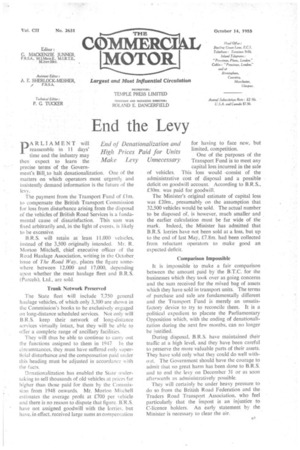End the Levy
Page 39

If you've noticed an error in this article please click here to report it so we can fix it.
pARLIAMENT will reassemble in 11 days' time and the industry may then expect to learn the• • Make Levy Unnecessary precise terms of the Govern ment's.Bil1,to halt denationalization. One of the matters on which operators most urgently and insistently demand information is the future of the levy.
The payment from the Transport Fund of Lim. to compensate the British Transport Commission for loss from disturbance arising from the disposal of the vehicles of 13ritish Road Services is a fundamental cause of dissatisfaction. This sum was fixed arbitrarily and, in the light of events, is likely to he excesSiVe. .
B.R.S.• will retain at' least 11.000 vehicles, instead of the 3,500 .originally intended. Mr. R. Morton Mitchell, chief executive officer of the Road Haulage AssOciation, writing in the October. issue of The Road ...Way, places the figure somewhere between 12,000 and 17,000, depending upon whether the meat haulage fleet and B.R.S. (Parcels), Ltd., are sold.
Trunk Network Preserved The State fleet will include 7,750 general haulage vehicles, of which only 3,300 are shown in the Commission's books to be exclusively engaged on long-distance scheduled services. Not only will B.R.S. keep their network of long-distance services virtually intact, but they will be able to offer a complete range of ancillary facilities.
They will thus be able to continue to carry out the functions assigned to them in 1947 In the circumstances, they must have suffered only superficial disturbance and the compensation paid under this heading must be adjusted in accordance with the. facts.
Denationalization has enabled the State undertaking to sell thousands of old vehicles at prices far higher than those paid for them by the Commission from 1948 onwards. Mr. Morton Mitchell estimates the average profit at £700 per vehicle and there is no reason to dispute that figure. B1R.S. have not assigned goodwill with the lorries, but have, in effect, received large sums as coin per-sation for having to face new, but limited, competition.
One of the purposes of the Transport Fund is to meet any capital loss incurred in the sale of vehicles. This loss would .consist of the administrative cost of disposal and a possible deficit on goodwill account. According to B.R.S., £30m. was paid for goodwill.
The Minister's original estimate of capital loss was £20m., presumably on the assumption that 32,500 vehicles would be sold. The actual number to be disposed of, is however, much smaller and the earlier calculation must be far wide of the mark. Indeed, the Minister has admitted that B.R.S. lorries have not been sold at a loss, but up to the end of last May, £7.8m, had been collected from reluctant operators to make good an expected deficit.
Comparison Impossible It is impossible to make a fair comparison between the amount paid by the B.T.C. for the businesses which they took over as going concerns and the sum received for the mixed bag of assets which they have sold in transport units. The terms of purchase and sale are fundamentally different and the Transport Fund is merely an unsatisfactory device to try to reconcile them. It is a political expedient to placate the Parliamentary Opposition which, with the ending of denationalization during the next few months, can no longer be iustified.
During disposal, B.R.S. have maintained their traffic at a high level, and they have been careful to preserve the more valuable parts of their assets. They 'have sold only what they could do well witho.u. The Government should have the courage to admit that no great harm has been done to B.R.S. and to end the levy on December 31 or as soon afterwards as administratively possible.
They will certainly be under heavy pressure to do so from the British Road Federation and the Traders Road Transport Association, who feel particularly that the impost is an injustice to C-licence holders. An early statement by the Minister is necessary to clear the air.




















































































































